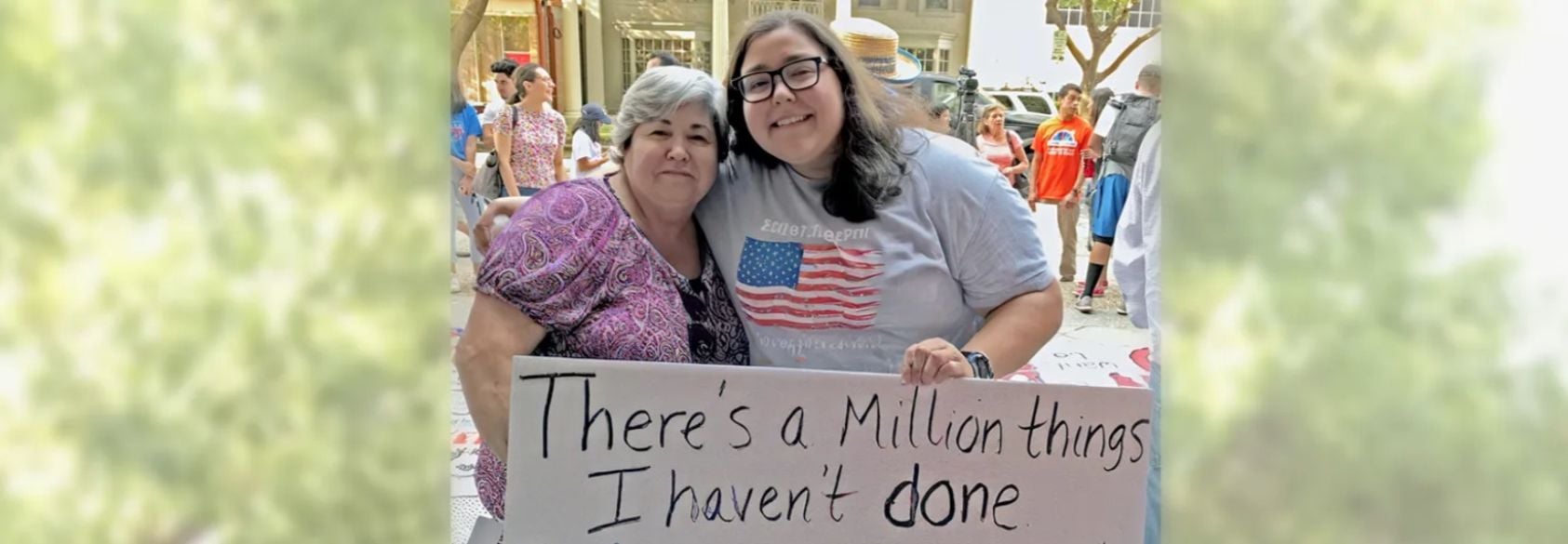Don’t panic, organize: Karen Reyes on the fight for immigrant rights
Karen Reyes, a teacher and DACA recipient, shares how she turned fear into action—organizing for immigrant rights and inspiring others to do the same.

Reyes and her mother at a protest.
Share
February 25, 2025
Karen Reyes, a teacher and DACA recipient, shares how she turned fear into action—organizing for immigrant rights and inspiring others to do the same.
Share
By Virginia Myers
Karen Reyes is one of the cheeriest people you’ll ever meet. Even in the face of strife and struggle — and she experiences plenty as an educator and an immigrant activist — she remains positive, always pressing forward, energized by the work of making the world a better place for her community.
But these days even Reyes is having a hard time. While she says she is trying to channel her “inner pre-K teacher optimism,” for many people the landscape for immigrant educators like her is bleak.
Reyes is a K-3 teacher for deaf and hard of hearing children, a long-time member of Education Austin and a DACA recipient. That means she came to this country as a child — in her case, she came from Mexico at age 2 — and has Deferred Action for Childhood Arrivals, an immigration status that affords her temporary freedom to work and build a life in the United States.
We shouldn’t panic. We need to organize. I’m not going to let that hate, xenophobia and racism win.
But Reyes’ status is precarious now that Donald Trump’s administration is focused on mass deportation. In addition to trying to support students and families who are afraid they will be torn apart by deportation, Reyes wonders what will happen to her personally after the January Texas court ruling that DACA is unlawful. A story she knows too well, Trump terminated DACA in his first term as president. Karen was part of an amicus brief in the Trump v. NAACP case that made it all the way to the U.S. Supreme Court, and while the defendants won in 2020, that hasn’t stopped other efforts to terminate the program.
The fear around DACA is palpable because no one knows how the Supreme Court will rule this time, if the case makes it to the high court. What if Reyes gets caught up in the changes and can’t show up for her students? What if she loses her status and has to move into the shadows, or leave the country? While the ruling applies only to Texas residents and will not be enforced until after an appeal, it is nevertheless another element of confusion and worry during what is already an unstable time.
Reyes was able to renew her DACA in December — in fact, attorneys advised many people to get the renewals before Trump changed policies and made it harder. That advice, says Reyes, probably saved thousands of people from more serious threats to their status.
It is these small actions — like immigration attorneys and legal experts warning DACA recipients to reapply as soon as possible — along with larger actions, like lawsuits and education campaigns, that will animate resistance to anti-immigrant policies.
I have no doubt in my mind that we’re gonna come in fighting. And we’ll come out winning.
Reyes herself is deeply committed to education programs, helping to conduct Know Your Rights workshops and distributing information to school families and out in the community about how to stay safe. (The AFT’s resources are available here.) She has been outspoken at rallies, at protests and even at the White House, where she was among former President Joe Biden’s DACA-recipient guests in 2021. Reyes was also one of the claimants in the 2019 AFT lawsuit to preserve DACA.
And she is a strong proponent of everything the AFT is doing to protect immigrants.
“If there’s one thing that the AFT does very well, it’s organizing,” says Reyes. “I have no doubt in my mind that we’re gonna come in fighting and try to be positive. And we’ll come out winning.” In her mind, Reyes says she keeps seeing the famous organizing fish: a big fish chasing smaller fish, until the smaller fish organize themselves into the biggest fish of all. “We know that the majority of the people are allies, that they do care. We just need them to understand the power they have.”
Meanwhile, Reyes is sure that the labor movement will persist. But she is disappointed that it is having to fight yet again for DACA, a program she says has had tremendous impact on the personal lives of people like her — and has also benefited the country as a whole.
Reyes will continue to immerse herself in the fight. Most recently, she attended a school district meeting and urged officials to proactively distribute Know Your Rights material to school families. “It’s our moral obligation to do everything in our power to keep our families safe,” she says. Reyes and her colleagues need details, like what to do if Immigration and Customs Enforcement agents come to the school with a warrant. Will teachers lose their jobs if they obstruct entry? Asking these questions feels risky, but Reyes persists.
What gives her courage? For one thing, during her visit to the Biden White House, which the president used to more clearly understand the precarious position of DACA recipients, Biden jokingly pegged her as a troublemaker. She took it as a compliment. Referring to the late John Lewis, she says, “I’m ready to cause some good trouble.”
“We shouldn’t panic. We need to organize,” says Reyes. “I’m not going to let that hate, xenophobia and racism win.”
Want to see more stories like this one? Subscribe to the SML e-newsletter!
Republished with permission from AFT Voices.
